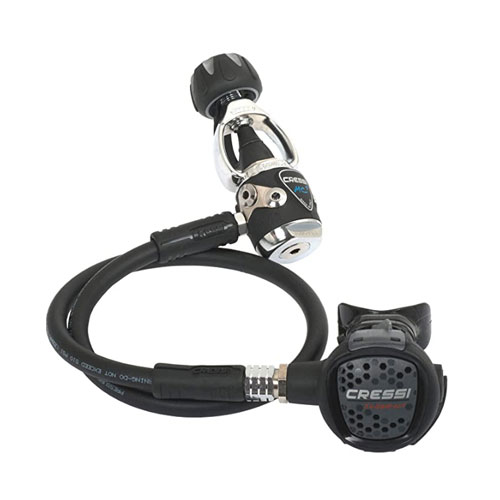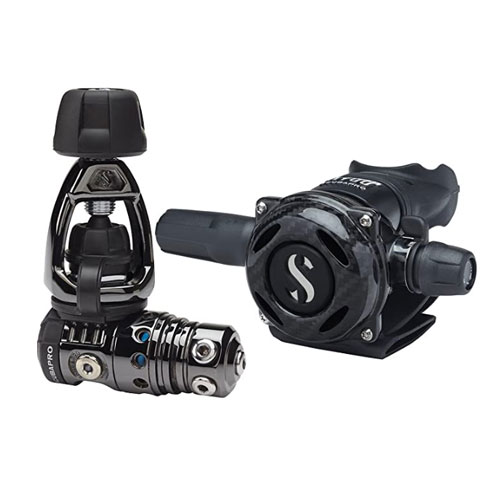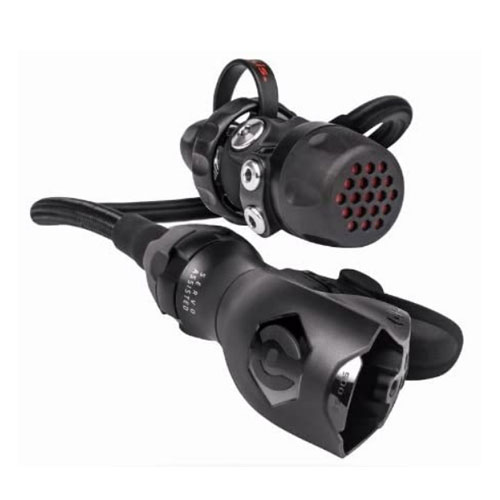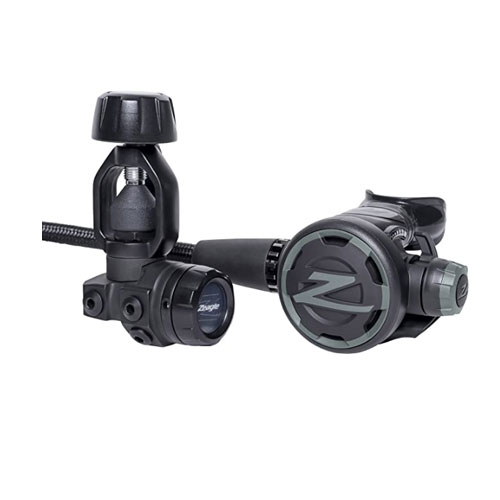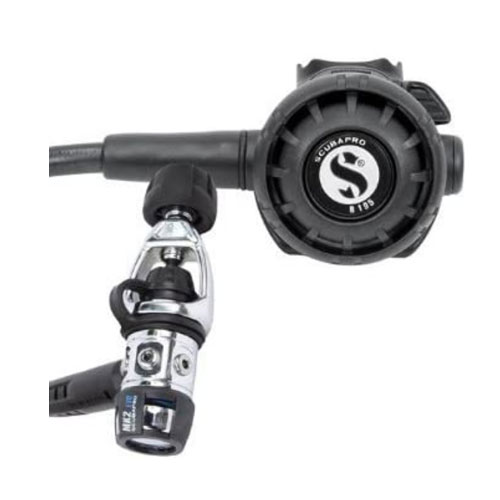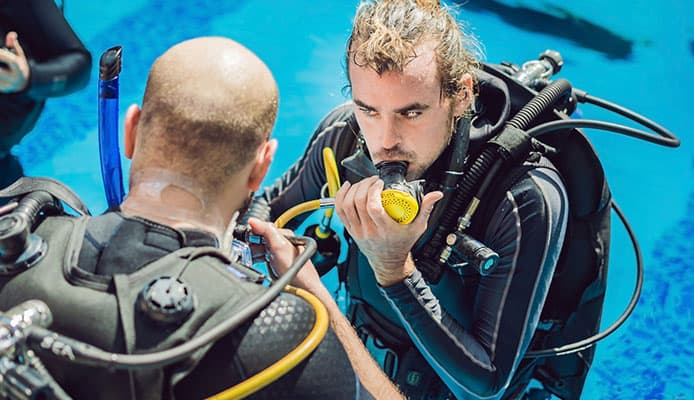
Jacques Cousteau and Emile Gagnan, recent inductees of the National Inventors Hall of Fame, are the inventors of the modern-day scuba regulator. The demand side regulator they designed to lead to the birth of today’s scuba industry. Today’s regulators are safe and highly reliable. However, when you are diving in cold water, most regulators will be prone to malfunction because of the build-up of ice. Icing can occur even when the water is not freezing. Water that is 40 degrees or colder, you will need a special regulator for cold water. Surface water temperatures can be much warmer than those at depth, so cold water divers will switch to a cold water regulator in 60-degree water.
The best cold water regulator will be heftier in its construction so that you can rely on it in rugged conditions. It will have features that ensure it won’t freeze or malfunction due to the lower temperature conditions.
It is important for your safety that you find quality cold water diving equipment. We have made a list of the five best cold-water regulators and included a detailed buying guide so that you can find the one right for you.
OUR TOP PICK
Cressi Elipse Titanium Regulator
- Stand Out Features - Why We Love It
- Made of high impact thermoplastic and titanium to be extra durable
- Lightweight and comfortable for diving
- Elliptical shape for better breathing management
- Environmentally sealed for better hose alignment
- Consistent airflow
- Easy to assemble for beginners or intermediate divers
Product Dimensions: 14 x 9 x 5 inches
Weight: 1.2 pounds
Materials: High impact thermoplastic and titanium
Features: Environmentally sealed, balanced diaphragm, four low-pressure and two high-pressure ports, hinge cover assembly, reduce mechanical friction
EDITORS CHOICE
ScubaPro MK25/A700 Regulator
- Stand Out Features - Why We Love It
- Air balanced pistons provide an ultra-fast breathing response
- Ideal for professional sport and recreational diving
- High airflow for a better performance
- Consistent air delivery, even with tank pressure changes
- Suitable for warm and cold water diving
- Comfortable rubber mouthpiece
Product Dimensions: 9 x 7 x 5 inches
Weight: 3.9 pounds
Materials: Chrome, brass
Features: Anti-freeze protection, 5 low-pressure ports, air balanced, flow-through piston
BEST VALUE
Hollis DC7 Regulator
- Stand Out Features - Why We Love It
- Comfortable with a servo-controlled valve
- Optimum airflow and smooth breathing
- Consistently delivers air at depths greater than 150 feet
- Side and back mount for custom positioning of your BCD
- Versatile and suitable for technical or recreational dives
- The orthodontic mouthpiece is easy to use and environmentally sealed
Materials: Brass, Delrin plastic, rubber, stainless steel, chrome-plated, silicone rubber
Features: Environmentally sealed, overbalanced diaphragm, 4 fixed low-pressure ports, easy to assemble underwater, left and right positioning
Oceanic Zeagle F8 Regulator
- Stand Out Features - Why We Love It
- Compact and great for traveling
- Brass and stainless-steel construction is durable but lightweight
- Dry sealed to stop freezing
- Environmentally sealed to stop contaminants
- Better performance with the balanced diaphragm
- Balanced diaphragm for improved performance
- Better breathing responsiveness with a co-molded silicone mouthpiece
Weight: 2.6 pounds
Materials: Brass, stainless steel
Features: Balanced diaphragm, Zirconium plate inlet tube, Nitrile O-rings, 5 low-pressure ports, precision machined neoflon seat
- Stand Out Features - Why We Love It
- Bulletproof construction for durability
- Extra reliable
- Downstream piston configuration is easy to control
- Ideal for beginner divers
- Customize with a DIN or yoke attachment
- Trouble-free design with minimum maintenance
Weight: 3 pounds
Materials: Plastic, stainless steel
Features: Downstream piston configuration, 3/8-inch low-pressure hose, minimum maintenance design
- While DIN Valves are more common in Europe, most places in Asia and America use Yoke Valves - requiring pricey converters to use.
- When traveling - especially by plane - you’ll want to keep the weight of your scuba equipment to a minimum to avoid further costs. Environmentally sealed bodies are often constructed with brass to minimize weight.
- Coldwater diving generally requires you to dive in a dry suit, so make sure your regulator offers enough ports to attach your Dry Suit inflator hose.
![]()
Scuba Diving Expert
How To Choose A Cold Water Regulator – Buying Guide
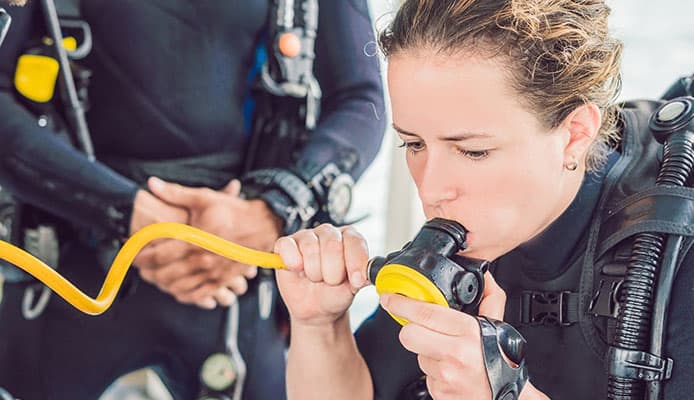
Environmentally Sealed
For cold water divers, the best cold-water regulator will be environmentally sealed because it also adds another layer of protection from the low temperatures. Coldwater does not come into contact with the moving parts of the regulator. The seal can also extend the lifetime of your scuba regulator for cold water diving because it prevents corrosion. But most importantly for cold water divers, an environmental seal will enhance your safety by ensuring that your regulator is always functioning as you dive.
Metal Second Stage
The second stage of your regulator is also important to consider because you want it to be durable. The best scuba regulator for cold water will be made of metal, which means that it is more suitable to withstand tough dive conditions. The chrome plate is a common metal used in cold water diving equipment, which is durable but lightweight.
The only downside to a metal second-stage dive regulator for cold water is that it will be more expensive than ones that are only made of plastic. But for the extra price of the investment, you will get a quality regulator for cold water that is longer lasting and more reliable in its performance.
Temperature
A top-rated scuba regulator for cold water may have a range of temperatures that it is compatible to function. Some designs can be used in both warm and cold water temperatures, which should be fine for most recreational divers. A regulator that has not been designed for cold water will freeze in water as warm as 40 degrees. The regulator will likely free flow.
The temperature should be indicated in the regulator’s product specifications, which can tell you in which climates it can be safely used. However, cold water regulator reviews may also be able to assist you in determining the proper water temperature conditions.
Valve
A top-rated scuba regulator for cold water may use a DIN or yoke valve. The two valves are not the same, so you must decide which one would be best for your dives. A DIN valve will attach directly to your scuba diving tank for a stronger and more stable seal. Due to the better seal, a DIN valve is preferred for most technical dives. A DIN valve will also perform better in cold water temperatures. The only downside is that a DIN valve requires more maintenance.
A yoke valve uses an external O-ring made of rubber to attach to your tank and because the seal is not directly connected to the tank, it is less stable. Yoke valves are preferred for warm water diving or recreational dives. They are easier to set up and require less maintenance.
Balance
A diving regulator for cold water should be balanced because it will provide you with a more consistent and better airflow as you descend into the water. When you are on low air, a balanced regulator will still provide you with the same amount of air, every time you breathe, until you have used the tank completely.
An unbalanced tank makes it more difficult to breathe as your tank supply runs low, which exhausts more of your energy.
Mechanism
There are two mechanisms that regulators for cold water use – a piston or diaphragm. A diaphragm regulator has flaps on the inside, which are forced open and closed as you breathe. This allows you to take steady and consistent breaths and provides you with free airflow. A diaphragm ice diving regulator will also likely be environmentally sealed, which can reduce damage and is important for cold water divers.
Piston regulators have a higher flow rate and are easier to breathe from, but they are more likely to malfunction in cold water conditions because the mechanism can get stuck. While piston regulators are more affordable and easier to maintain, you may find that because they are not environmentally sealed their performance is less consistent.
Weight
When you’re holding a piece of gear in your mouth for extended periods, the weight of the regulator can be an important consideration to your overall comfort. The best scuba regulator for cold water will be lightweight so that you don’t suffer from jaw fatigue under the waves.
Some regulators will use titanium to cut down on the overall weight, but keep in mind that titanium isn’t the best for cold water dives. Brass or nickel are better choices because they are hardier and more durable, while still being lightweight. A lightweight scuba diving regulator for cold water will also be better for traveling.
You might also like: Best Scuba Masks For Small Faces
Ports
Ports are what allow you to connect devices to your regulator. For warm water divers, you need fewer ports. But cold water divers need more ports so that they can attach multiple gauges to safely dive in challenging conditions. Ports cannot be added to a regulator’s design, so you must choose a model that has more ports than fewer.
FAQs
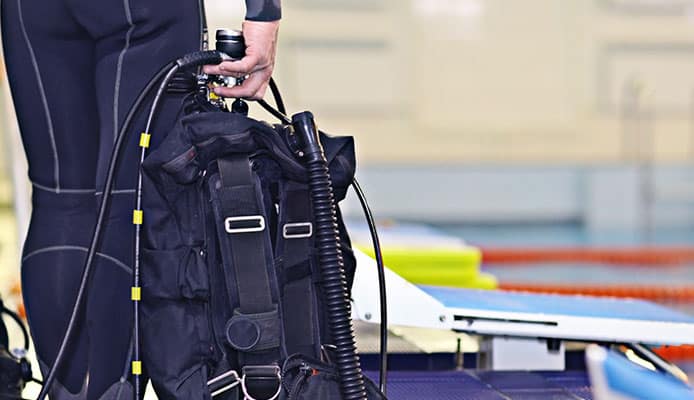
Q: How Do I Test My Scuba Regulator?
For your safety, you must regularly check all your cold water diving equipment and ensure that it is in working order for your next dive. A regulator needs to be checked before each dive to ensure that the mechanism is fully functioning.
The best cold water regulator will include instructions that will give you a step-by-step breakdown of how to test your regulator, so you are always prepared.
Q: Where Can I Use A Cold Water Scuba Regulator?
This will depend on your regulator’s design. Some regulators are suitable for warm and cold water dive conditions. However, it is always best to check the temperature rating of your regulator. Some ice diving regulators are best used only in cold water conditions and most warm water regulators will fail in cold temperatures.
Q: How To Prevent A Scuba Regulator From Freezing?
Freezing is dangerous for regulators because it can cause the device to free-flow, which means that you have lost control of your air supply. This can cause you to use up your air supply too quickly and can lead to fatal accidents. The best scuba regulator for cold water should have features included in the design, which will prevent the mechanism from freezing.
Globo Surf Overview
Scuba diving is a thrilling experience, but to have the best time and for you to be safe, you need to use the proper gear. Coldwater diving equipment is designed to handle extremely low temperatures and rough water conditions. You should only dive cold water with a regulator designed for cold water. With our guide, we hope that we provided you with all the information you need to purchase the best cold-water regulator so that you can dive confidently.



